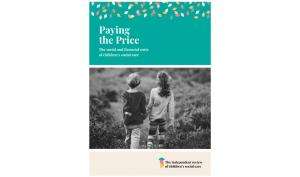£23 billion a year is the cost of adverse childhood, says England's children's social care review report

Published by Professional Social Work magazine, 2 December, 2021
The “social cost” of childhood adversity as measured by reduced quality of life, lowered economic productivity, poorer health and increased crime is £23 billion a year, according to a new study.
The analysis, commissioned by England’s Independent Review of Children’s Social Care (IRCC), estimates the cost for each child who has need of a social worker in their lives to be £14,000 annually.
Over an average lifespan of 81 years, that equates to £720,000 per person. For those who have been looked after, the figure rises to £1.2 million per person.
A report highlighting the findings says this demonstrates “the very significant costs of lost potential, unfulfilled dreams and shortened lives”.
Called Paying the Price, the social and financial costs of children’s social care, it also calculates the annual cost of children’s social care in England to be £13.1 billion a year, 25 per cent higher than previous estimates.
In a foreword to the report Josh MacAlister, chair of IRCC, said the data would help the review “understand how to make recommendations that can better allocate resources and invest to avoid such poor lifetime outcomes”.
The review is due to make its final recommendations for reforming children’s social care in England next spring.
The latest analysis comes in the wake of the IRCC’s The Case for Change report. Taking together, they suggest final recommendations are likely to call for funding to be focused on downstream preventative interventions.
Published during the summer, The Case for Change said: “When we consider the case for investment, it is important we do not only focus on the cost of services, but also the longer-term cost of later life outcomes of children…”
Greater support for families chimes with a renewed Westminster focus on early help, with £500 million announced to support families in the autumn budget.
This included creating 75 ‘family hubs’ providing community-based universal services, part of the Westminster government’s Best Start for Life strategy.
The latest analysis by business management consultants Alma Economics looked at two costs: the annual spend on children’s social care and the “social cost of adverse outcomes”.
The £13.1 billion annual spend on children’s social care services was calculated for the pre-Covid year of 2019/20 and combines local and national spending.
It includes “indirect” spend such as legal costs to bring children into care and preventative services but not “administrative spend” such as on Ofsted.
Local authority expenditure on children’s social care is calculated as £10.5 billion a year, of which more than half – £5.3 billion – is on looked after children.
The rest is made up of safeguarding, family support, Sure Start centres, youth justice and other services for young people.
A further £1.2 billion is spend on legal costs – the majority £800 million of which is borne by central government.
Addition costs to the public purse include mental and physical health services for children who have social work involvement, criminal justice and educational spending, totalling £1.3 billion.
In estimating the £23 billion cost of adverse outcomes, MaAlister emphasised the figures are averages, with “huge variation across children”.
They are calculated for each year from birth to the UK’s average life expectancy of 81 years based on children who either need a social worker or are looked after.
Outcomes looked at are reduced employment opportunities, loss of earnings, increased anxiety and depression, substance misuse, anti-social behaviour, offending, homelessness and mortality compared with the general population.
According to Alma Economics, its figures are “likely to be underestimates” as there is “limited evidence” on some adverse outcomes.
McAlister said: “The toll of early adversity, loss and trauma for children who have social care involvement is substantial and is borne acutely over a lifetime by children themselves. The moral case for change is indisputable.
“Through this report we want to add weight to the case for changing children’s social care, adding hard headed economic analysis.”
The report, however, attracted some criticism. One Twitter commentator said: “You really need to consider the impact of austerity on children and families and the impact of privatisation services on costs. Failure to do this makes your review worthless.”
